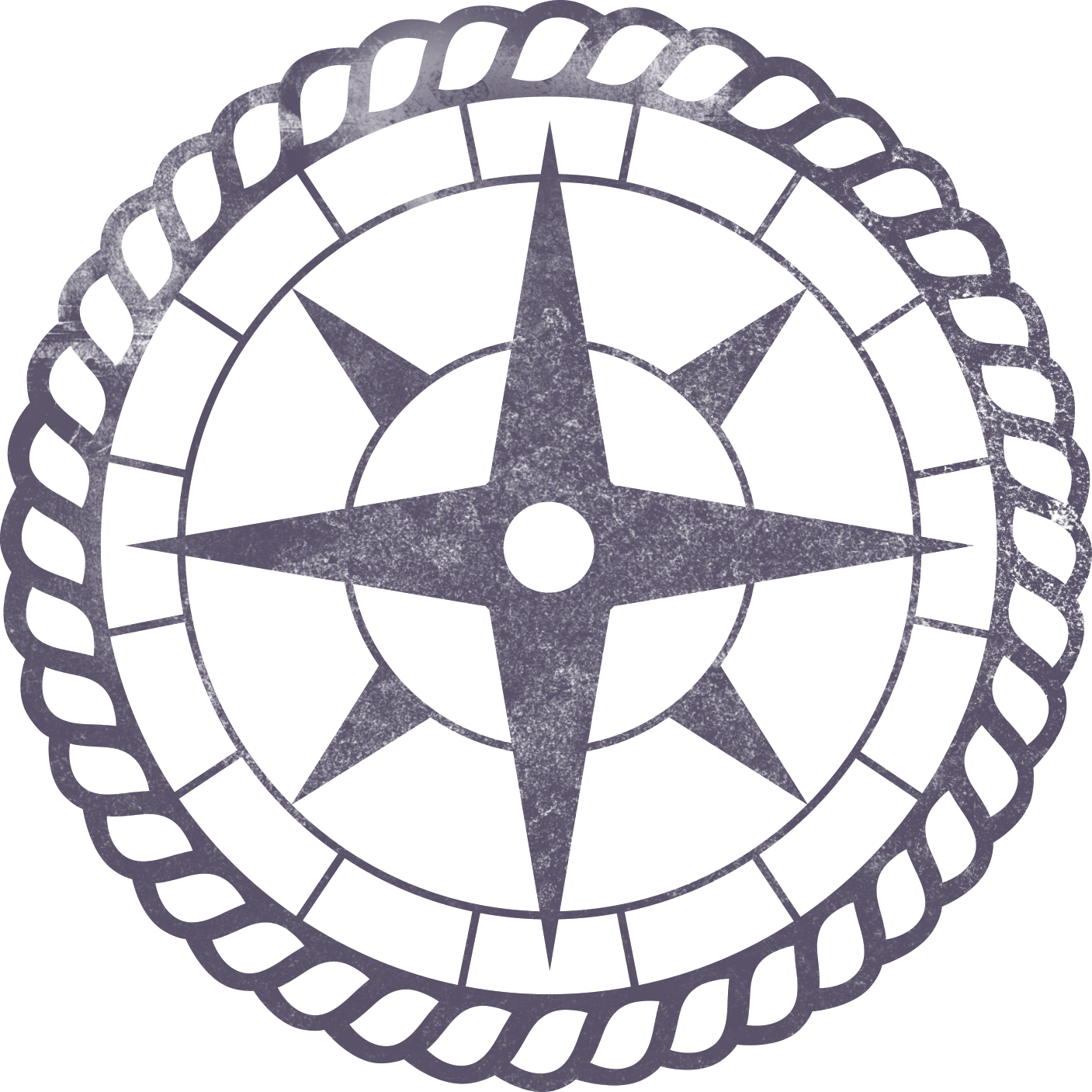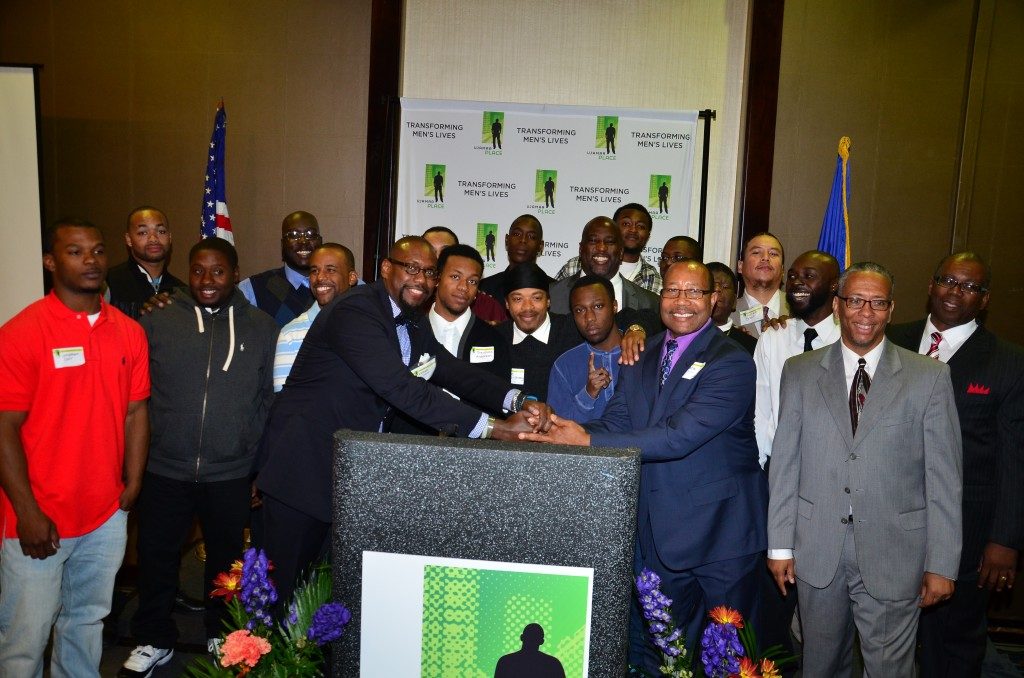
“You, me, all of us, we do this together. We are a family. Like the ‘Holy Trinity,’ we move forward and make change together.”
Otis Zanders, President & CEO, Ujamaa Place
Greetings VOBS Friends,
The Swahili word “ujamaa” means, “extended family” or “brotherhood.” Ujamaa as a concept means, becoming a person “through the people or community,” what Otis Zanders calls, “the safe village.”
Otis Zanders is the President and CEO of Ujamaa Place. Ujamaa is a St. Paul, Minn. nonprofit serving “young African American men primarily between the ages of 18 and 30, who are economically disadvantaged and have experienced repeated cycles of failure.” The Ujamaa mission is “rooted in the philosophy of African American culture and empowerment – that everyone is important, valuable, worthy, and loveable.”
I was fortunate to sit down with Otis Zanders, virtually, over Zoom, last week. As readers of this weekly communication may know, I reached out to Otis in the wake of George Floyd’s murder to offer VOBS’ support. As fellow regional nonprofit leaders (our offices are within five minutes of each other) we stay in touch.
Ujamaa and VOBS began working together in 2015, to serve Ujamaa men with leadership development. In 2017 and 2018, we began serving cohorts of men pursuing trade work through Ujamaa, collaborating to deliver Insight (day long) programs– rock climbing, high ropes, canoeing, orienteering– to help build confidence and brotherhood for those pursuing apprenticeship and becoming journeymen.
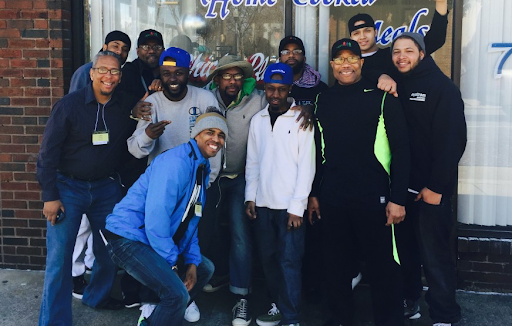
It took a while for us to to figure out how best Outward Bound curriculum could support the construction cohort and their goals. After working with the Ujamaa team and delivering programs for a variety of men, we finally discovered we had the potential to support the construction cohort specifically, as some men were losing confidence and dropping out mid-program, just shy of earning certification.
Together, we decided to focus on providing more intense programming at this crucial midpoint. This kind of collaborative trial, improvement and co-creation, is indicative of our long-term community partnerships. We start with pilot programs, gather beta information, figure out how we can best serve participants and organizational goals and build the experience accordingly.
In 2018, just as things started clicking along with the construction cohort, Ujamaa lost some critical funding and key coordination staff. The Ujamaa team asked VOBS to pause the partnership program until we could all re-group. Unfortunately, this is a reality of nonprofit work (we certainly experience the same hiccups here at VOBS, our current COVID pause on programs is the most extreme case in point). Funding and staffing ups and downs are a reality of community partnership. I’m sharing this because I think it’s important to understand the true nature of partnership. Partnership means that, together, you stick with it for the long haul and keep looking for possibilities despite setbacks. Together, you find a way forward and Ujamaa and VOBS will find a way forward now too.
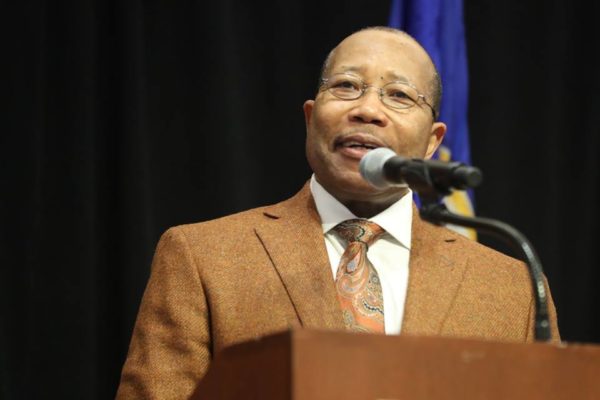
I also reached out to Otis because Ujamaa’s work is central at this moment and VOBS recognizes Ujamaa and Otis Zanders as leaders and teachers in anti-racism. Part of our commitment to stand in solidarity right now and better advance anti-racism is to listen to and lift up those leading the way. Otis said to me:
“I am George Floyd. Ujamaa men are George Floyd. Every single one of these men is George Floyd.”
VOBS, like many organizations, is trying to learn from George Floyd, and his murder, and it is my intention, and VOBS’ intention, to continue to listen to, learn from and lift up our community partners and those–alumni, friends, peers, stakeholders– who advance anti-racism and equity work in our community.
Otis’ personal history, his 35-year career with the Minnesota Department of Corrections,and his subsequent second career in leading Ujamaa, are an inspiration to the community and to me.
Here is a bit of Otis’ biography, republished with the permission of Ujamaa Place:
“Otis Zanders’ was raised during the Jim Crow era in Mississippi. He was the first family member to finish high school. His mother insisted he attend college, in which he fulfilled her wish by winning an academic scholarship to Gustavus Adolphus College in St. Peter, Minn. Mr. Zanders credits his mother who instilled a value system based on his African ancestry of love, strength, determination and fighting for the most marginalized populations in society.
Mr. Zanders received an internship with the Minnesota Department of Corrections during his final semester at Gustavus Adolphus College in January 1977. During his nearly 35-year career with the DOC, Zanders served at various locations around Minnesota and retired as warden of the Minnesota Correctional Facility in Red Wing, Minn.
In 2012, Mr. Zanders decided he was not quite ready for retirement and accepted the role as President/CEO of Ujamaa Place. His dedication and commitment to Ujamaa Place in serving marginalized African American men at the most vulnerable age, 18-30, many of whom lack education, are homeless, unemployed, have mental and chemical dependency issues and involvement with the criminal justice system, is his calling. His mission is supported and acknowledged throughout the communities he serves. Zanders can often be found advocating for the men he serves at the State’s legislative sessions and out in the community speaking to audiences large and small about the roadblocks that Ujamaa men face on their journey to transformation.
In 2018, Otis was the recipient of St. Paul and Minnesota Foundations’ Facing Race Award for his dedication and service to improving the lives of the marginalized population in the communities he serves and around the nation. Ujamaa Place, under the leadership of Mr. Zanders, received the 2018 Mission Award for Anti-Racism initiative from the Minnesota Council of Nonprofits.”
I invite you to view and listen to Otis’ Facing Race Award introduction to Ujamaa Place.
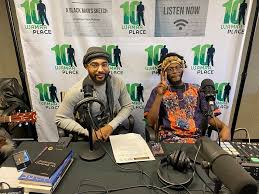
As I listened to Otis talk about his long career with corrections, I began to understand his motivation for working in that space to begin with and his decision to lead Ujamaa. Otis is a compassionate humanitarian. He does not talk about “offenders,” he talks about “people.” Instead of “felonies” he talks about “mistakes,” and instead of “recidivism,” he talks about and creates the structure for transformation.
“I got into Corrections because I wanted to make a difference, and I’ve always wanted to understand people. Over the years, I’ve come to understand that you have to look beyond the felony, you have to look at the person. You cannot judge until you swim back upstream and understand a person’s history. We can’t incarcerate our way out of problems; it doesn’t work. We have to try as hard as we can to remain human. It’s part of my DNA now to swim back upstream and work to understand what someone is dealing with. Addressing the root cause, that is what prevents recidivism. Moving from corrections to Ujamaa was very natural because I don’t see an offender, I see a person who has made a mistake and I know if we address why, we can transform lives.”
Ujamaa Place practice is informed by a Theory of Transformation or ToT (this may resonate with Outward Bound folks who talk about our “Theory of Change”). The Ujamaa ToT is about creating a “safe village” of support– housing, mentoring, wellness counselling, employment, education– to give men recovering from incarceration or stepping out of foster care the tools, the resources and the compassion to grow and make positive change in their lives. This support system rests on a foundation of African American culture and pride. Otis says:
“The young men we work with know how to survive, what they need to learn how to do is live.”
Ujamaa men learn how to live, how to aspire and dream, how to hope and work for the same things everyone else does– job, family, comfort, joy. This is about empowerment. How do I empower myself? How do I hope, dream and find purpose? These men must find confidence to trust the journey. And we are all in this journey together. The men, their families, Ujamaa. You, me, all of us, we do this together. We are a family. Like the ‘Holy Trinity,’ we move forward and make change together.”
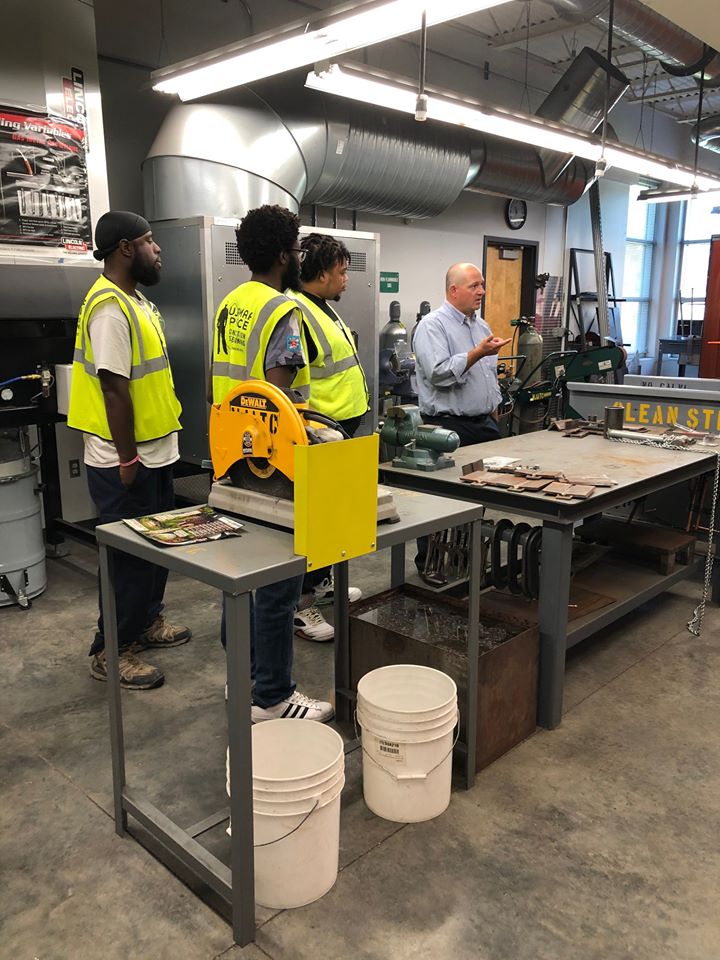
I am very grateful to Otis Zanders for sharing his experience and work with me and our readers and I am humbled by Ujamaa’s work. Please enjoy this Q&A with Otis:
Q: What is Ujamaa Place’s mission and/or vision?
A: Ujamaa Place serves primarily African American men aged 18-30 who have suffered from chronic bouts of homelessness, unemployment, addiction, connection to the criminal justice system and trauma from living life on the streets. As a result, the men experienced interruptions in their education and are academically at a 4th to 8th grade education level when they enroll in Ujamaa Place.
Q: Why do you serve who you serve?
A: Ujamaa Place has been on the front lines of social and criminal justice advocacy in Minnesota focused on the most marginalized population, African American men aged 18-30, who have lived a life of system poverty and survival on the streets. Many Ujamaa men have experience with the criminal justice system. Though Minnesota does not have a death penalty penal system, it ranks amongst the highest in the nation in mass incarceration of African American, Native American and Hispanic men. Ujamaa Place wraps stabilization services around the men in its Theory of Transformation (ToT) logic model to restore hope and dreams of a prosperous life, where they can take care of their family and community.
Q: What change is Ujamaa striving for in the community?
A: The Theory of Transformation (ToT) journey begins with stabilization services by assigning each man to a high-context coach. Initial mentoring and coaching sessions result in a transformation plan that gives the men access to 37 support services at no charge, used to support reaching their goals outlined in their Individual Transformation Plan (ITP.) The ToT logic model consists of four technical programs (Education, Employment, Housing and Behavior Health) supported by three critical wraparound support programs (Cultural History, Criminal Justice Advocacy and 37 Transformation Services) that view high-context coaches as the social change engineers of the organization, all critical in the transformation of the most marginalized population in society, African American men, aged 18-30.
Q: How are you and Ujamaa working toward this change?
A: I feel that NOW is the time to strategize ways to confront systemic racism in every form of injustice that exists in communities across Black America. We have to be the change. No one is coming to save us. History is being written that will teach future generations that freedom and equality is not a given. We must fight for it.
Q: What challenges or successes would you like to share our readers?
A: Our hearts are broken from the generational trauma and human rights atrocities that our people have suffered for 400 years since the recording of the first slave ship’s arrival in the United States. We must allow the voices and strength of our ancestors to guide us through these unprecedented times and the challenging waters ahead.
As the son of sharecroppers from the Mississippi Delta, I witnessed firsthand, at a very young age, the clear connection between the legacy of slavery and American Capitalism. Today, as a husband, father, and CEO of Ujamaa Place, I still see the ways in which the legacy of slavery lives on through systemic racism and plays out in the everyday lives of African Americans.
The world witnessed George Floyd take his last breath as the knee of a white police officer lay on his neck restricting his airways, with members of the community pleading for his life. This was a reminder that we are not yet FREE from the bonds of slavery. The institution of slavery and its byproducts – racism, inequality, poverty and injustice are alive and well in our society today. This is why at Ujamaa Place, we focus on teaching our men to navigate systems of racism and ways to eliminate roadblocks that perpetuate inequality.
Q: What advice do you have for potential allies?
A: Allies can support us by denouncing racism and inequality in all forms. We pray that the solidarity we are witnessing from around the world is a sign that we are collectively ready to pluck the ugly root of systemic racism for good. We regret that it took the murders of George Floyd, Philando Castile, Eric Garner, Ahmaud Arbery and countless others for people to finally be fed up. We stand on mighty shoulders that taught us freedom and justice is not a given, and that we must continue to teach each generation to fight for equality. We ask allies to join us in our mission.
Q: What help or support does Ujamaa Place need?
A: Donations help Ujamaa Place provide programming within a community environment that assists men with mental and chemical health wellness, achieving stable housing, re-engaging with their families, attaining work and life skills essential to self-sufficiency, with a strong focus on education, work-entry programming, specific skills training, employment retention and personal financial management.
Q: How should the community get in touch with Ujamaa?
Website: ujamaaplace.org
Phone: 651-528-8006
Email: info@ujamaaplace.org
To learn more about Ujamaa Place:
I am a Ujamaa Man
Ujamaa Impact & Outcomes
How Covid 19 Impacts Ujamaa Place
Letter to Our Beloved Community
Before we said good-bye, I asked Otis what VOBS can do. This was his advice:
“This is about tomorrow, it’s about 2021, and the year after that. Our challenge is to keep hope alive. Don’t sugar coat the situation. We all saw the face of racism. Now we must understand our role every day. We’ve got to be willing to call it out when we see it. Be willing to have conversations like we are today. Denounce racism in all its forms. Re-imagine health care, education, policing. Find inspiration, find strength.”
Thank you to Otis Zanders and Ujamaa Place. We are grateful to you for leading the way.
Please support our community partnership programs.


